Maine Lobster – An Iconic, Sustainable Industry Worth Fighting For
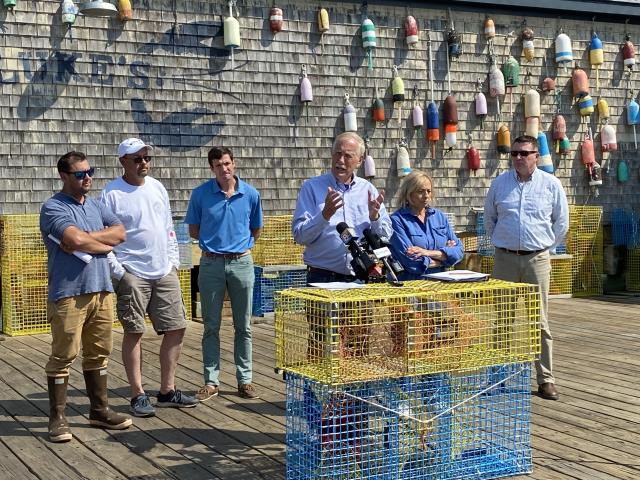
Maine lobster. It's a part of who we are. For generations, the delicious crustacean has supported countless Maine families, represented our state around the world, and served as a major economic driver for our coastal communities.
But right now, our iconic industry – and the thousands of people and small businesses who rely on it – find themselves in immediate peril.
Why? Not climate change, business interests, or supply chains. The urgent threat to Maine lobstermen is a California-based interest group that has appointed itself judge, jury, and executioner of the industry. And here’s the truly stunning thing – it was done without any real evidence.
This month, the California-based Monterey Bay Aquarium’s Seafood Watch added Maine lobster to their “red list” of seafood to avoid due to environmental impacts. In attempting to make their case, they presented unsubstantiated threats that right whales are being entangled or harmed by the wires of lobsterpots. In the days since, multiple national retailers have pulled the product from their shelves, with others weighing doing so.
Make no mistake, the declining population of North Atlantic right whales is a serious issue, and one that we all agree requires action. What it does not need is allegations and misinformation in the place of science-based solutions.
The late Senator Patrick Moynihan famously said “everyone is entitled to their own opinion, but not their own facts.” Here are some.
- There has never been a right whale death attributed to the Maine lobster industry.
- There hasn’t been a right whale entanglement attributed to Maine lobstering since 2004.
- Since 2017, the majority of the right whale deaths reported have been attributed to ship strikes in Canadian waters.
In fact, recent years have seen a climate-driven migration of both lobster and right whales that has mostly separated the two populations. At this point, the overwhelming majority of lobster caught in Maine come from outside critical right whale habitat, and represent less than three percent of the overall risk to the species.
That’s pretty clear and compelling context. You would think that a historically detail-oriented scientific organization would have included it in their report, or have substantial evidence that outweighs these realities.
But they don’t. Instead, Seafood Watch admits in its report that “due to a lack of information, it is often not possible to assign entanglements to a specific fishery,” and that Maine lobstermen may not be to blame for whale deaths. They decide to punish Mainers anyways, saying nobody should purchase lobster “until there is more specific information available.”
In other words, the Maine lobster industry is guilty until proven innocent. These assertions are suppositions wrapped in assumptions inside conjectures.
Along with Governor Mills and the state's entire Congressional delegation, I’m asking Seafood Watch to reverse this attack on the hardworking, conservation-minded lobster industry. I've taken the fight nationwide and have made Maine's position clear on CNN, MSNBC, and in TIME. I sincerely hope Seafood Watch will listen to reason and we will not stop fighting until the damage done to our state is made right.
Making Elections More Fair and Transparent
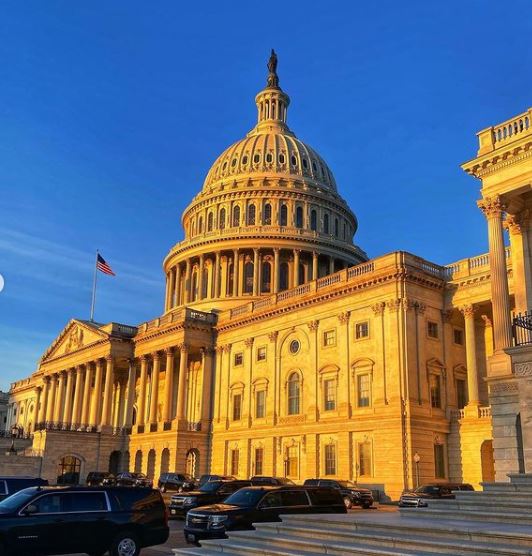
It's frustrating every election season – you turn on your TV only to be bombarded by dubious ads paid for by anonymous groups called absurd names like "Americans for Greener Grass." You rarely ever know who is backing them, what their agenda is, or why they have it out for a specific candidate or issue.
Not only is this frustrating, it's a real threat to our democratic principles. For example: if a nurse in Stonington donates $75 to their political candidate it’s disclosed, but if a billionaire wants to pour millions into an election, they can do so anonymously. It simply makes no sense, and it’s not fair.
The foundation of American democracy is everyday people making their voices heard and holding their leaders accountable. This unlimited "Dark" money is a real and present threat to these democratic values – it removes accountability from our political process.
The Senate tried to change that disparity this month with the DISCLOSE Act. This commonsense bill would have brought long overdue transparency to our political process by requiring dark money groups to finally disclose who is backing them. It also would have been a much-needed step to keep foreign money out of American elections. I've always found that sunlight is the best disinfectant, especially for dark money’s corrosive effects on our democratic process.
Despite these pretty commonsense efforts, the bill was blocked by partisan politics – it's disappointing and I honestly don’t understand why it could be even slightly controversial. While it's definitely a setback, I'll keep pushing to make politics more transparent and hopefully make those ads just a bit less annoying.
Fighting PFAS Near Maine's Military Installations
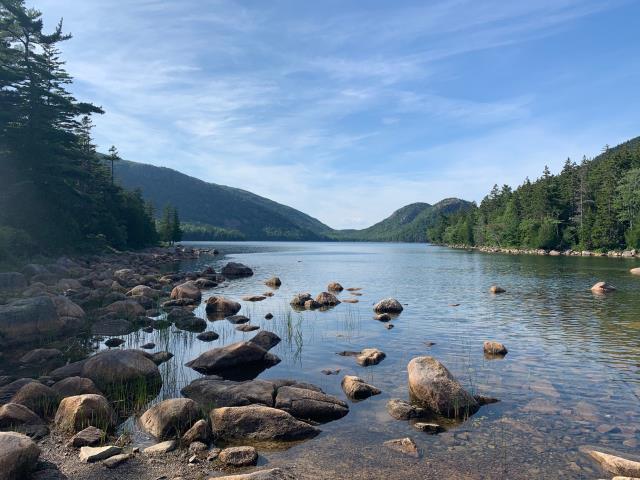
The threat of PFAS is abundantly clear: if not addressed, the contaminants are a danger to our state's water, farmlands, and way of life. More and more of our communities are seeing the impacts of the chemicals and we need a coordinated whole-of-government approach to take on the challenge before it's too late.
It seems that some of the communities where PFAS is at its worst are where the Department of Defense (DOD) has current or former instillations – like Maine's former Loring Air Force Base and Brunswick Naval Air Station.
Over the past six years, Congress has given the Pentagon over $1 billion in new funding to address these contaminants and help these communities, but frankly, it doesn't feel like they're using their funds with the urgency that's needed. Simply put, the DOD is not sufficiently prioritizing PFAS testing, remediation and disposal, nor are they developing the appropriate plans to utilize the funds they have – let alone more in the future.
This needs to change, and a bipartisan group of my colleagues and I are calling on the Pentagon to fix the unacceptable shortcomings. They need to rapidly develop plans to combat PFAS and show that they can use their funding to support the communities in Maine who have been impacted by these dangerous contaminants.
I sincerely hope the DOD will meet this moment and help with the PFAS identification and remediation Maine communities need – this is simply too important for anything short of an all hands on deck response.
Protecting Our Democratic Process
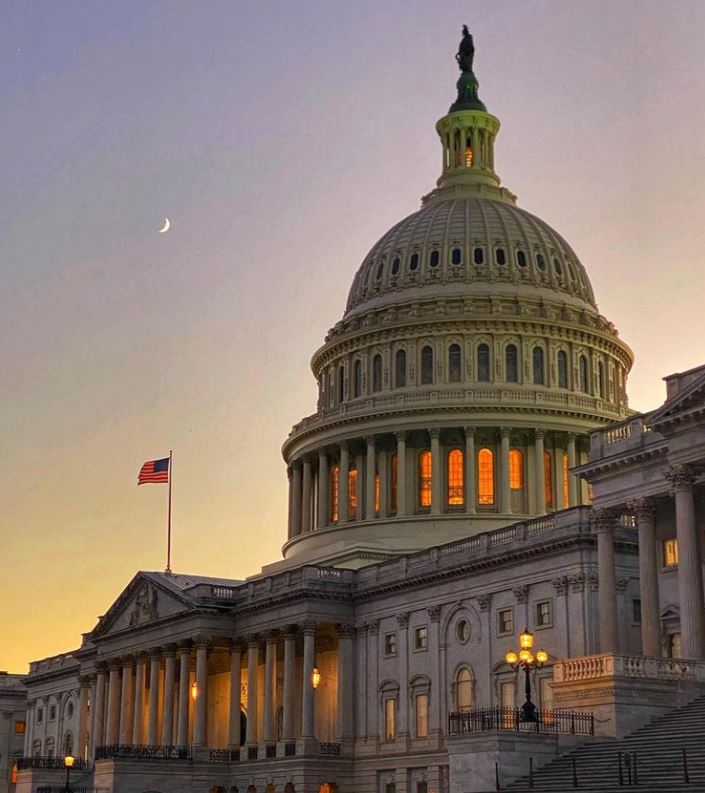
American democracy is a relative anomaly in history – for thousands of years most of the world has been ruled by czars, pharaohs, and kings. Our system of government by the people and for the people is rare, and it's fragile.
On January 6th of last year, this fragile democracy experienced one of the most serious threats in decades when factions attempted to exploit the ambiguities of an outdated law known as the Electoral Count Act (ECA) of 1887 to overturn the results of a free and fair election. Now, as some continue to raise doubts about our electoral system, Congress has been working to ensure that the ECA cannot be used as a weapon against our democracy by disappointed candidates of either party.
After months of research and discussion with experts, I released an ECA reform bill discussion draft in February to inform the Senate-wide efforts to update the antiquated law. It included several recommendations for how we could improve the counting and certification of electoral votes that would make the process clearer and more resistant to attack.
Using many of the suggestions from this discussion draft, on Tuesday the Senate Rules and Administration Committee passed a package of comprehensive ECA reforms by an overwhelming 14 to 1 vote. It's a critical step to better protect American democracy and remove dangerous ambiguities from our presidential elections – I'm proud to have been one of the 14 bipartisan Senators voting yes.
While I continue to look for ways to better protect the democratic process for all Americans registered to vote, this effort will guarantee that the will of the voters cannot be undermined after votes are cast. I’m heartened to see the bipartisan support this package received and I look forward to the full Senate passing these reforms before the conclusion of this Congressional session.
Seeing the County's New Logging Investments

I try to get up to the County every summer, both to visit old friends, but also because I’ve found that even just one day of seeing is worth a hundred days of reading. This August, I RV’d up north to see some of the new investments being made in Aroostook, especially in the forest products industry.
My first stop was at Louisiana Pacific (LP) Houlton to see their new $150 million investment in modern house siding. After years of producing oriented strand board, LP transitioned to wood-strand siding – called SmartSide Trim and Siding – a product in much higher demand. Going forward, LP will be producing 220 million square feet of their weather-resistant trim and siding annually – enough for 100,000 houses. The expansion into the 21st century product will help the company retain their phenomenal workforce and access entirely new global markets. It’s a big deal for LP Houlton, the more than one hundred people who work there, and the communities who rely on them.
With this expansion, LP will need thirty percent more trees a year – almost all of which they get from local forests. This will boost the entire County industry and create more work for everyone from processors and distributors to truckers and loggers. The only challenge now is making sure we have enough trained loggers to get LP the Maine wood they need.
That’s why later in my trip I went to Northern Maine Community College (NMCC) to see how stakeholders across the County are rising to meet this moment. With growing demand for equipment-trained loggers, NMCC is receiving $1 million from the new Congressionally-Directed Spending program to expand their 12-week, tuition-free Mechanized Logging Operations course. Now, they’ll be able to train 15 people a year on the highly-technical, cutting edge equipment used in modern logging.
I was proud to support this federal investment, and am excited to see how it will address logger shortages and build upon ongoing efforts with the FOR/Maine Initiative while giving more Maine people access to these good jobs.
Look, our forest products industry has faced some real challenges and the Jay mill closure this month is a real blow. Times haven’t always been easy for our logging communities; but with investments like these and the hard work being done across the industry, I firmly believe the future of Maine’s forest products industry is bright. Together, we’re going to continue to create new jobs, reach new markets, and solidify the foundation of our heritage industries well into the future.
Improving Access to Katahdin Woods and Waters
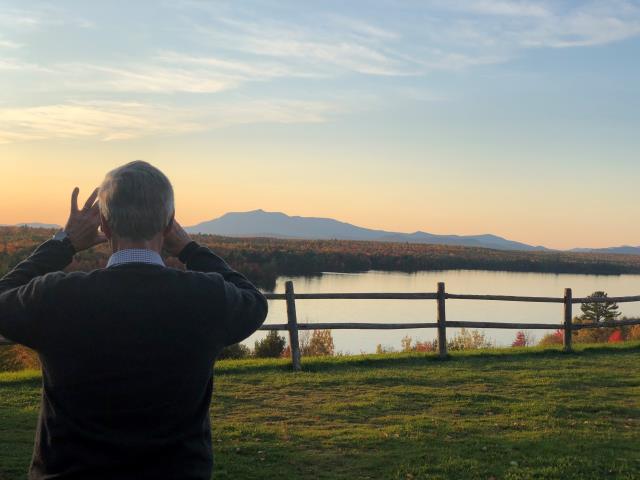
Six years ago, after significant local feedback and coordination, President Obama designated a swath of our state's most gorgeous, untouched land to be preserved as the Katahdin Woods and Waters National Monument.
Like a lot of people, I had some reservations when we were originally establishing the Monument – it had to respect local land use: hunting, logging, snowmobiling, and all the other ways people have long used the land. In the years since, I think it's become clear that not only has it met these important conditions, it's brought more people to the area and been a huge boost to local businesses.
But don't just take my word for it. As Chair of the Senate National Parks Subcommittee, we held a hearing recently to receive feedback from local leaders on the Monument.
In the hearing, Steve Richardson – a business owner and true pillar of the Katahdin Area community – told me that the Monument has become "a beacon of hope drawing new people, more visitors, and increased investment to our communities." His store he said, has experienced "minimum 20% year over year" growth since KWW was established.
I think we can (and should) build on this success and help the Monument attract more people to the region. That's why, in the hearing, I asked for feedback from local leaders like Steve on a new bill I introduced with Senator Collins to improve Monument access.
The bill is pretty simple – it allows willing landowners south of the Monument to donate or sell pieces of land that will help create a new Millinocket entrance. This would make accessing the Monument easier, and bring visitors right through the heart of town instead of the roundabout route they currently have to take. It would all be done while respecting the rights of local landowners and protecting the important uses of the land.
The bottom line: it's a commonsense opportunity to bring more business to the area and grow the Monument's success. I'll keep you updated on the effort and its progress, and for the meantime, if you have thoughts on the Monument, the bill, or anything else, you can get in touch at: king.senate.gov/contact.
Confirming A Maine Resident for A Key Cyber Diplomacy Post
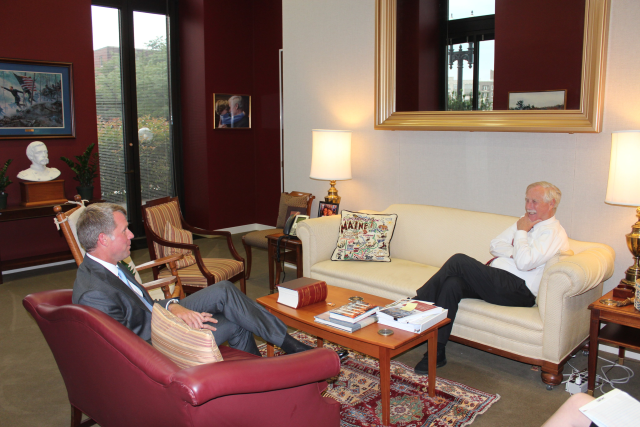
Protecting America's cyberspace takes more than just strong defenses, it requires international cooperation and partnership with our allies. Currently, there's a dangerous lack of international cyber norms, and the United States must step up our efforts. This was one of the key recommendations of the Cyberspace Solarium Commission I co-chaired: to create an office within the State Department that can coordinate a global response to the rapidly changing cyber landscape.
Earlier this year, the Biden administration listened to our calls, established the Bureau of Cyberspace and Digital Policy, and nominated Cape Elizabeth resident Nate Fick to lead the new department.
You could not find a more perfect candidate for the job than Nate. From serving as a Marine in Iraq and Afghanistan, to leading one of the country's foremost software companies, Nate has demonstrated extraordinary leadership, and a deep understanding of the cyber threats facing our country. He's immensely well qualified and I have been proud to support him for the role.
This month, after receiving broad, bipartisan support from the Senate Foreign Relations Committee, Nate was confirmed unanimously to the critical ambassadorship – a testament to the importance of the job and his impressive qualifications. It's a historic, long overdue step to address our rapidly-changing cyber environment, and I look forward to a continued partnership with the Ambassador on the cyber issues facing our country.
Seeing the First-Hand Impacts of Congressionally Directed Spending
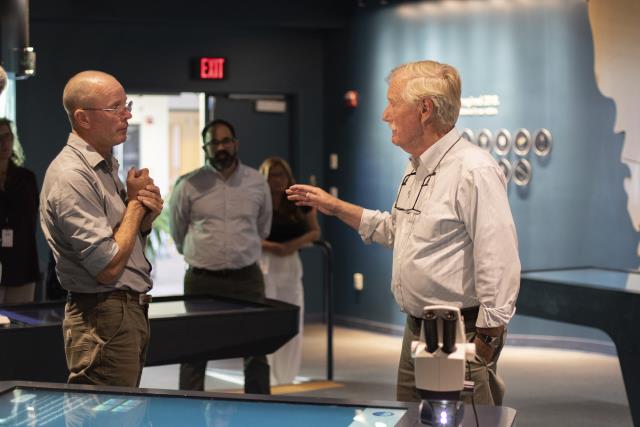
Last year, Congress restored the practice of Congressionally-Directed Spending (CDS) that allows Members of Congress, rather than unelected government employees, to direct funding to a state, locality, or non-profit group for projects that demonstrate civic and community value. I was proud to help secure ninety-three 2022 CDS investments totaling $137,252,598 to support Maine people, organizations, and communities.
One of the places receiving this support was Portland's Gulf of Maine Research Institute that is receiving $1,382,000 in CDS to support the long-term health of Maine’s waters and ocean economy. Last month, I was excited to tour GMRI with some of their leaders and scientists to see the work they're doing and what these funds will mean for their mission.
As Maine's waters and coastal communities adapt to a changing climate and economy, the funds will expand GMRI's Blue Economy Initiative and Climate Center. Together, these two projects will help the seafood industry adapt to the rapidly shifting dynamics, reach new global markets, and develop climate-resilient strategies. It'll mean a brighter future for Maine’s coast and all the people who rely on it.
Seeing these projects firsthand was a powerful reminder of how Congressionally-Directed Spending is being responsive to our state’s needs and the hard work that is being done to secure a better Maine. I’m incredibly proud that we were able to help GMRI receive this funding.
There are dozens of similar success stories that we were able to include in last year’s spending bill. You can find the CDS investments coming to your communities with our interactive map. Check it out HERE.
September Policy Update
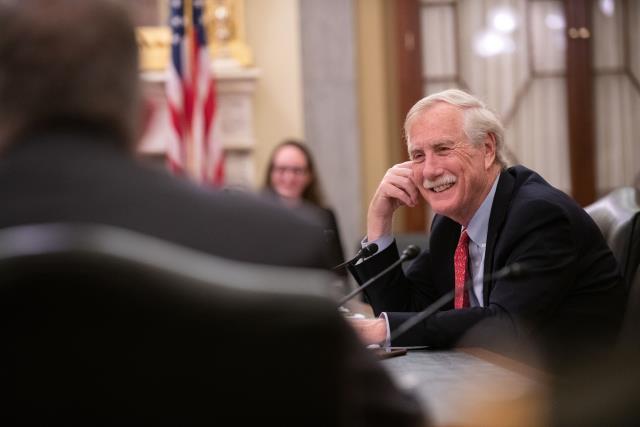
As a reminder, you can read more on my regularly updated press release page at king.senate.gov. Here are some other priorities I’ve been working on:
- Giving couples tax refunds they should have received. Senator Collins and I are co-sponsoring legislation allowing same-sex couples to claim tax refunds that were denied to them before nationwide recognition of their marriages occurred. Read more HERE.
- Protecting election workers from threats. I cosponsored the Election Worker Protection Act to provide states with resources to recruit and train election workers and ensure these workers’ safety, while also instituting federal safeguards to shield election workers from intimidation and threats. Read more HERE.
- Helping Maine farmers meet climate challenges. Maine's Congressional Delegation announced $385 million for nine projects that will benefit Maine’s forest products and agriculture industries while helping to combat climate change. Read more HERE.
- Addressing dangers of senior fall incidents. I joined with Senator Bob Casey (D-Penn.), Chairman of the Senate Special Committee on Aging, to urge the Biden administration to improve senior fall-prevention efforts. Read more HERE.
- Celebrating National Lobster Day. Senator Susan Collins and I celebrated September 25th as “National Lobster Day.” The designation was established through a resolution that passed the Senate unanimously. Read more HERE.
In The News
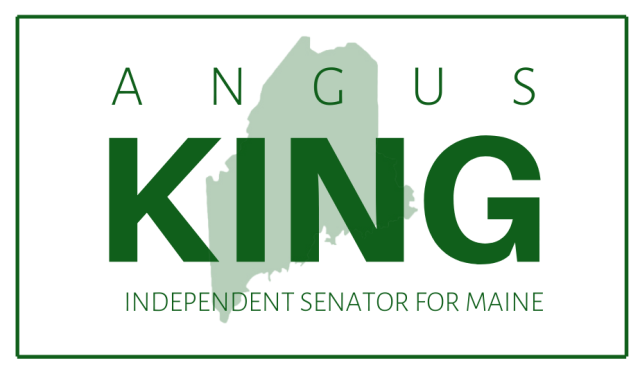
Thanks for subscribing to my monthly newsletter! I would love to hear your ideas for how we can make Maine and our country a better place. Please feel free to reach out with any questions, comments, or concerns by visiting: https://www.king.senate.gov/contact –we look forward to hearing from you.
All the best, and stay healthy!

To unsubscribe to this e-Newsletter click HERE.
|